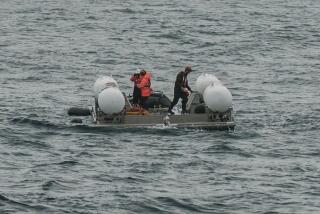Rescued Russians Get Cabin Fever
- Share via
PETROPAVLOVSK-KAMCHATSKY, Russia — Seven sailors rescued from a mini-submarine hours before their air supply would have run out faced a new problem Monday: Confined to a hospital, they wanted out.
“The crew were almost complaining about being put in a general ward: ‘We’re OK, we just want to go home,’ ” Rossiya television reported.
The men, trapped 600 feet beneath the Bering Sea, were rescued Sunday after a remote-controlled British “Scorpio” underwater craft cut through cables and fishing nets that had ensnared their mini-sub Thursday. They had an estimated six to 12 hours of air left.
They also were running short of water, the men said Monday in comments on Rossiya and NTV.
“We weren’t out of water, we just didn’t have enough of it,” said crew member Alexander Uybin. “We were short of oxygen too. Not badly, but we could feel in our bodies that we weren’t getting enough.”
Uybin said his first wish when the mini-sub surfaced was “to take a breath of fresh air.”
A reporter asked what they had most wanted when they reached a rescue ship. One of the men called out, “To eat!”
“Yes, to eat!” Uybin agreed.
Gennady Bolonin, a representative of the company that made the 43-foot AS-28 mini-submarine and who was among the seven men trapped, said they had simply tried to be patient.
“We realized we were on the bottom and reported it,” he said. “All we could do was wait for whatever decisions were taken. After we’d said we were stuck, we just lay down and waited.”
Temperatures in the craft reportedly were about 40 degrees, and the men tried to share their body heat during the ordeal. “We put on [thermal] diving overalls, and when you are keeping very close together, you get warm,” Bolonin said.
Defense Minister Sergei B. Ivanov told reporters that Russia had robotic vehicles similar to the British Scorpio, but it would have taken longer to bring them to the scene.
“Our mini-subs even eclipse Scorpios in some specifications, but trail them in mobility,” Ivanov said at a news conference in Vilyuchinsk, 11 miles north of here. “Air-lifting of our deep-water robots to Kamchatka would have taken much more time.”
Ivanov said that a special commission had been appointed to analyze the actions of the Pacific Fleet and the Defense Ministry, and that those involved would undergo a debriefing.
There have been allegations that the Russian navy initially tried to keep the accident secret, and sought foreign help only after the news leaked out, apparently through the relatives of the trapped men.
“The main thing is that the people are alive,” Ivanov said at the news conference. “They are alive thanks to their personal stamina and bravery, as well as thanks to efforts of Russian and foreign rescuers who jointly carried out a unique operation.”
NTV reported that the cost of the rescue for the Russians alone was estimated by navy headquarters at about $1.5 million. Foreign participants had not made any requests for reimbursement of expenses, it said.
More to Read
Sign up for Essential California
The most important California stories and recommendations in your inbox every morning.
You may occasionally receive promotional content from the Los Angeles Times.













